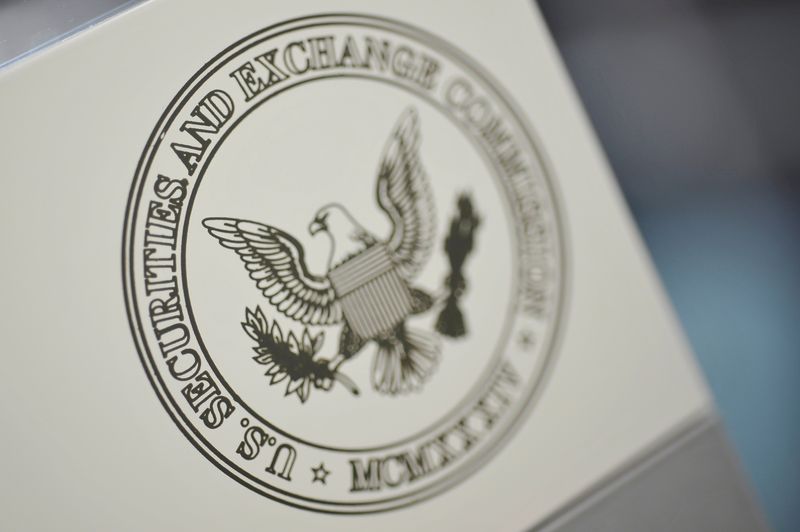By Jody Godoy
(Reuters) -Ripple Labs Inc did not violate federal securities law by selling its XRP token on public exchanges, a U.S. judge ruled on Thursday, a landmark legal victory for the cryptocurrency industry that sent the value of XRP soaring.
XRP was up 75% by late afternoon on Thursday, according to Refinitiv Eikon data.
The ruling by U.S. District Judge Analisa Torres was the first win for a cryptocurrency company in a case brought by the U.S. Securities and Exchange Commission -- though it did also give the SEC a partial victory.
While the decision is specific to the facts of the case, it likely will provide ammunition for other crypto firms battling the SEC over whether their products fall under the regulator's jurisdiction.
An SEC spokesperson said the agency was pleased with part of the ruling in which the judge held that Ripple violated federal securities law by selling XRP directly to sophisticated investors.
It is possible for the ruling to be appealed once a final judgment is issued, or if the judge allows it before then.
The SEC spokesperson said the regulator was reviewing the decision.
Ripple Chief Executive Brad Garlinghouse in an interview called the ruling "a huge win for Ripple but more importantly for the industry overall in the U.S."
Coinbase (NASDAQ:COIN), the largest U.S. crypto exchange, said it would again allow trading of XRP on its platform.
"We’ve read Judge Torres’ thoughtful decision. We’ve carefully reviewed our analysis. It’s time to relist," Coinbase chief legal officer Paul Grewal said on Twitter.
Coinbase stock closed up 24% at $107 per share on Thursday.
WHEN CRYPTO IS NOT A SECURITY
The SEC had accused the company and its current and former chief executives of conducting a $1.3 billion unregistered securities offering by selling XRP, which Ripple's founders created in 2012.
The case has been closely watched in the cryptocurrency industry, which disputes the SEC's assertion that the vast majority of crypto tokens are securities and subject to its strict investor protection rules. The agency has brought more than 100 enforcement crypto actions, claiming various tokens are securities, but many of those have ended in settlements.
In the few cases that have gone to court, judges have agreed with the SEC that the crypto assets at issue were securities, which unlike assets such as commodities are strictly regulated, must be registered with the SEC by their issuer and require detailed disclosures to inform investors of potential risks.
Torres ruled that Ripple's XRP sales on public cryptocurrency exchanges were not offers of securities under the law, because purchasers did not have a reasonable expectation of profit tied to Ripple's efforts.
Those sales were "blind bid/ask transactions," she said, in which buyers "could not have known if their payments of money went to Ripple, or any other seller of XRP."
Torres applied a U.S. Supreme Court case that said "an investment of money in a common enterprise with profits to come solely from the efforts of others," is a kind of security called an investment contract.
XRP sales on cryptocurrency platforms by Garlinghouse and co-founder and former CEO Chris Larsen, and other distributions including compensation to employees also did not involve securities, Torres ruled.
PARTIAL WIN FOR THE SEC
The SEC won a partial victory as Torres found the company's $728.9 million of XRP sales to hedge funds and other sophisticated buyers amounted to unregistered sales of securities.
Torres ruled that Ripple's marketing aimed at institutional investors made clear the company "was pitching a speculative value proposition for XRP" that depended on company efforts to develop the blockchain infrastructure behind the digital asset.
She said a jury must decide whether Garlinghouse and Larsen aided the company's violation of law, and that the defendants cannot argue at trial that they lacked "fair notice" that XRP was a cryptocurrency.
"The law does not require the SEC to warn all potential violators on an individual or industry level," she said.
CALLS FOR LEGISLATION
Gary DeWaal, an attorney at Katten Muchin Rosenman, said the ruling should help Coinbase in fighting its own SEC case.
The market reaction indicates the ruling is a "tremendous event for the industry," he said.
Both the Ripple and Coinbase cases focus on registration requirements and whether certain digital assets are securities under U.S. law.
The crypto industry has called for legislation to provide clear rules for tokens, and the ruling brought new calls for Congress to clarify the status of digital assets.

House of Representatives Majority Whip Tom Emmer, a Republican, in a post on Twitter said the ruling established that "a token is separate and distinct from an investment contract it may or may not be part of."
"Now, let’s make it law," he said.